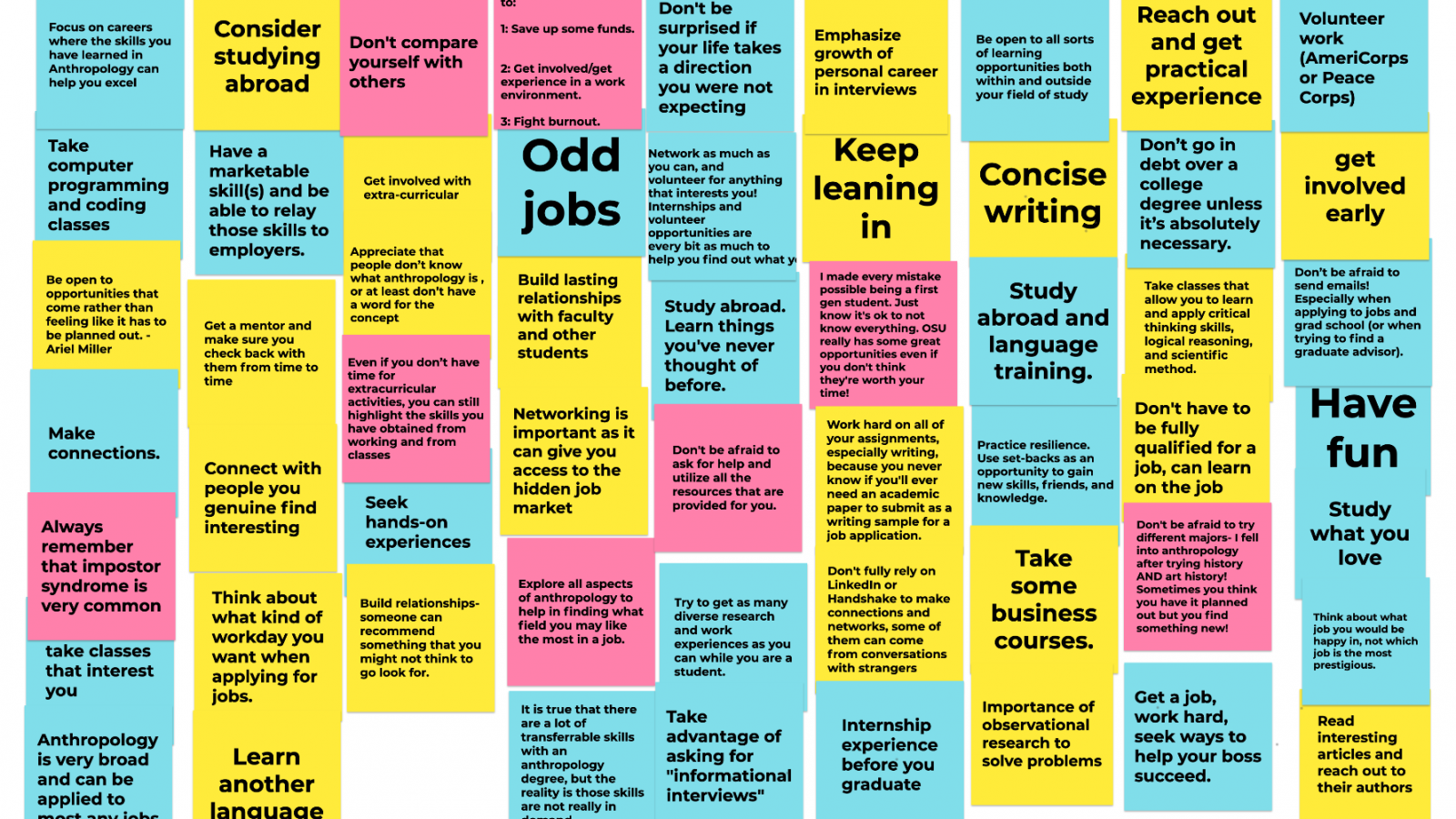Students in ANTHROP 3005: Careers with Anthropology (AU21) created this composition with advice from alumni (blue), guests interview in class (yellow), and added their own advice (pink) using Google Jamboard. The advice is also listed below.
Focus on careers where the skill you have learned in Anthropology can help you excel (blue)
Consider Studying abroad (yellow)
Don’t compare yourself with others (pink)
Consider a gap year to: (pink)
- Save up some funds.
- Get involved/get experience in a work environment
- Fight Burnout.
Don’t be surprised if your life takes a direction you were not expecting (blue)
Emphasize growth of personal career in interviews (yellow)
Be open to all sorts of learning opportunities both within and outside your field of study (blue)
Reach out and get practical experience (yellow)
Volunteer work (AmeriCorps or Peace Corps) (blue)
Take computer programming and coding classes (blue)
Have a marketable skill(s) and be able to relay those skills to employers (blue)
Get involved with extra-curricular activities (yellow)
Appreciate that people don’t know what anthropology is, or at least don’t have a word for the concept (yellow)
Odd Jobs (blue)
Network as much as you can, and volunteer for anything that interests you! Internships and volunteer opportunities are every bit as much to help you find out what you want (blue)
Keep leaning in (yellow)
Concise writing (yellow)
Don’t go in debt over a college degree unless it’s absolutely necessary (blue)
Get involved early (yellow)
Be open to opportunities that come rather than feel like it has to be planned out – Ariel Miller (yellow)
Get a mentor and make sure you check back with them from time to time (yellow)
Even if you don’t have time for extracurricular activities, you can still highlight the skills you have obtained from working and from classes (pink)
Build lasting relationships with faculty and other students (yellow)
Study abroad. Learn things you’ve never thought of before (blue)
I made every mistake possible being a first gen student. Just know it’s ok to not know everything. OSU really has some great opportunities even though you don’t think they’re worth your time. (pink)
Study abroad and language training (blue)
Take classes that allow you to learn and apply critical thinking skills, logical reasoning, and scientific method. (yellow)
Don’t be afraid to send emails! Especially when applying to jobs and grad school (or when trying to find a graduate advisor) (blue)
Make connections (blue)
Connect with people you genuinely find interesting (yellow)
Seek hands-on experience (blue)
Networking is important as it can give you access to the hidden job market (yellow)
Don’t be afraid to ask for help and utilize all the resources that are provided for you. (pink)
Work hard on all assignments, especially writing, because you never know if you’ll ever need an academic paper to submit as a writing sample for a job application (yellow)
Practice resilience. Use set-backs as an opportunity to gain new skills, friends, and knowledge (blue)
Don’t have to be fully qualified for a job, can learn on the job (yellow)
Have fun (blue)
Always remember that imposter syndrome is very common. (pink)
Think about what kind of workday you want when applying for jobs (yellow)
Build relationships – someone can recommend something that you might not think to go look for (yellow)
Explore all aspects of Anthropology to help in finding what field you may like the most in a job. (pink)
Try to get as many diverse research and work experiences as you can while you are a student (blue)
Don’t fully rely on LinkedIn or Handshake to make connections and networks, some of them can come from conversations with strangers (yellow)
Take some business courses (yellow)
Don’t be afraid to try different majors – I fell into anthropology after trying history AND art history! Sometimes you think you have it planned out but you find something new! (pink)
Study what you love (blue)
Take classes that interest you (blue)
Think about what kind of workday you want when applying for jobs (yellow)
Think about what job you would be happy in, not which job is the most prestigious (blue)
Anthropology is very broad and can be applied to most any jobs (blue)
Learn another language (yellow)
It is true that there are a lot of transferable skills with an anthropology degree, but the reality is that those skills are not really in demand (blue)
Take advantage of asking for “Informational Interviews” (blue)
Internship experience before you graduate (blue)
Importance of observational research to solve problems (yellow)
Get a job, work hard, seek ways to help your boss succeed (blue)
Read interesting articles and reach out to their authors (yellow)

